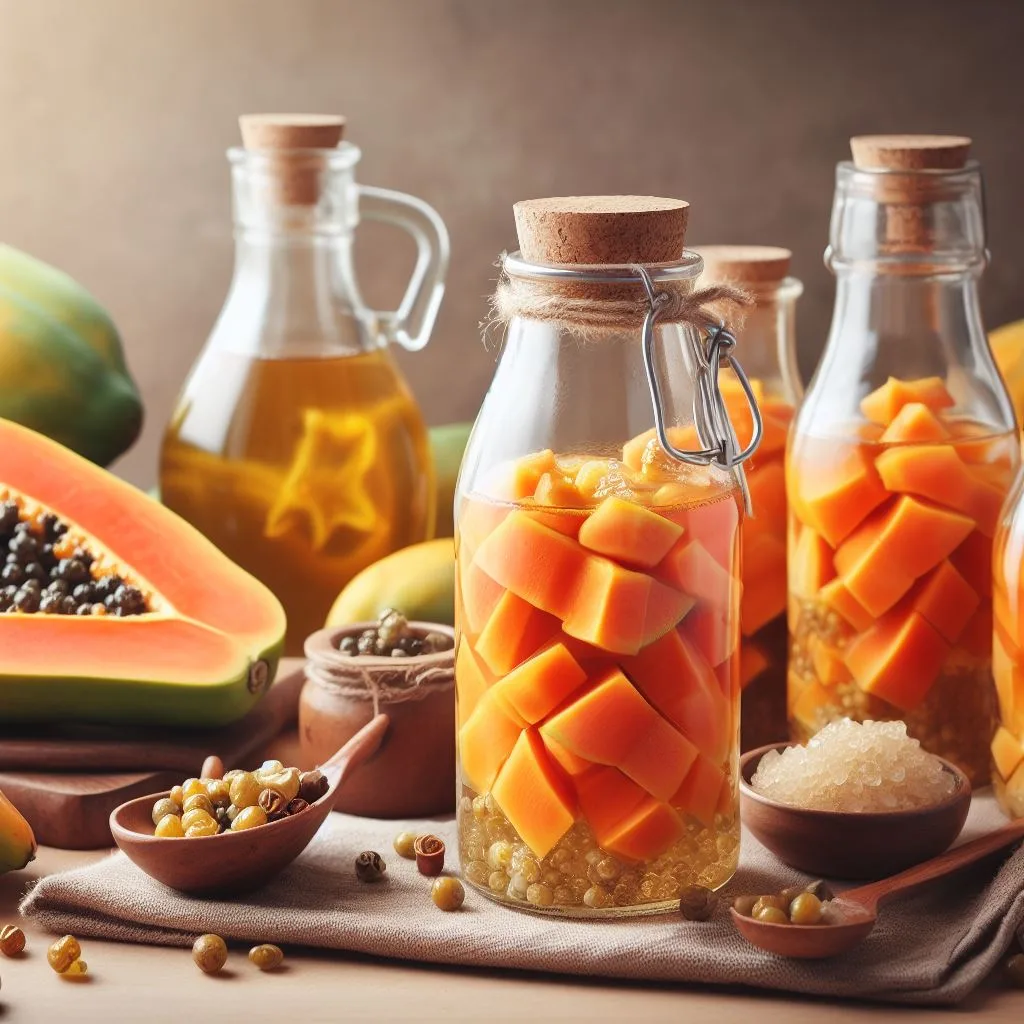
Introduction: Exploring the Unique Flavors of Papaya Vinegar
Welcome to our exploration of the unique flavors of papaya vinegar. In recent years, this tropical fruit vinegar has gained popularity for its distinct taste and versatility in various culinary applications. Whether you are a seasoned chef or an adventurous home cook, papaya vinegar offers a delightful twist to your dishes.
Papaya vinegar is made by fermenting ripe papayas, resulting in a tangy and slightly sweet flavor profile that sets it apart from other fruit vinegars. Its vibrant tropical notes add a refreshing touch to both savory and sweet recipes.
One of the key benefits of papaya vinegar is its versatility in the kitchen. It can be used as a salad dressing, marinade, or even as an ingredient in sauces and glazes. Its acidity helps tenderize meats while adding depth of flavor to grilled vegetables. Additionally, papaya vinegar pairs exceptionally well with seafood dishes, enhancing their natural flavors.
For those who enjoy experimenting with homemade fruit vinegars, making your own papaya vinegar can be a rewarding experience. By combining ripe papayas with water and sugar, you can create a base for fermentation that will develop into a flavorful vinegar over time.
In this section, we will delve into the various uses of papayavinegar in culinary creations. From vibrant salads to mouthwatering sauces and delectable desserts, we will explore how this unique ingredient can elevate your cooking endeavors. So join us as we embark on this flavorful journey through the world of papaya vinegar and discover new ways to incorporate it into your favorite recipes
Step-by-Step Guide to Making Homemade PapayaVinegar
Making homemade papaya vinegar is a simple and rewarding process. Here is a step-by-step guide to help you create your own flavorful tropical fruit vinegar:
- Gather the ingredients: You will need fresh papaya, apple cider vinegar, and sugar.
- Prepare the papaya: Start by peeling the papaya and removing the seeds. Cut it into small pieces for easier fermentation.
- Combine ingredients in a glass jar: Take a clean glass jar and add the papaya pieces to it. Pour in apple cider vinegar until it covers the fruit completely.
- Sweeten to taste: Add sugar to the mixture according to your personal preferences. The amount can vary depending on how sweet or tart you want your vinegar to be.
- Cover and secure: To protect your mixture from dust or insects, cover the jar with either a cheesecloth or plastic wrap, securing it with a rubber band around the rim of the jar.
- Fermentation time: Place the jar in a cool and dark place for approximately two weeks, allowing fermentation to occur naturally during this period.
- Strain out solids: After two weeks have passed, strain the mixture using either a fine-mesh sieve or cheesecloth to remove any solid particles from your vinegar.
- Ready for use: Congratulations! Your homemade papayavinegar is now ready for use in various culinary creations such as dressings, marinades, sauces, or even as an ingredient in refreshing beverages. By following this step-by-step guide, you can enjoy making your own tropical fruit vinegar that adds unique flavor notes to your dishes while also being able to control its sweetness level according to personal preference.
Creative Ways to Use Papaya Vinegar in Your Cooking
Papaya vinegar is a versatile ingredient that can add a unique and refreshing twist to your cooking. Here are some creative ways to use papaya vinegar in your culinary creations:
1. Create refreshing salad dressings: Combine papayavinegar with olive oil and herbs to make a delightful papaya vinaigrette dressing. This fruity salad dressing recipe will bring a tropical flair to your greens.
2. Marinate meat or seafood: Use papayavinegar as a marinade for meat or seafood dishes. Its tangy and tropical flavor will infuse into the protein, adding depth and complexity to your dish. Try using it in a tangy meat marinade recipe for an exciting burst of flavor.
3. Drizzle over fresh fruits: Give your fresh fruits an extra zing by drizzling them with papayavinegar. This will not only add sweetness but also provide a unique twist that complements the natural flavors of the fruit. Consider trying it as a topping for fruit salads or as a fruity dessert topping.
These are just some of the creative ways you can incorporate papaya vinegar into your cooking repertoire. Get adventurous with this flavorful ingredient, and let its tangy and tropical notes elevate your dishes to new heights!
Conclusion: Elevate Your Culinary Experience with Homemade Papaya Vinegar
In conclusion, homemade papaya vinegar offers numerous benefits and advantages that can elevate your culinary experience. The unique tropical flavors of papaya add a delightful twist to your dishes, making them more vibrant and exciting.
One of the key advantages of homemade fruit vinegars, including papayavinegar, is the control you have over the ingredients. By making it at home, you can ensure that only high-quality papayas are used, resulting in a superior flavor profile. Additionally, you have the freedom to experiment with different combinations of fruits and spices to create your own personalized blend.
Papaya vinegar also offers several health benefits. Papayas are rich in vitamins A and C, antioxidants, and enzymes that aid digestion. Incorporating papaya vinegar into your cooking not only enhances the taste but also provides a nutritional boost.
Furthermore, using homemade fruit vinegars allows you to avoid artificial additives and preservatives commonly found in store-bought versions. You can have peace of mind knowing that your papaya vinegar is made from natural ingredients without any unwanted chemicals.
So why not take your culinary skills to the next level by incorporating homemade papaya vinegar into your cooking? Its unique tropical flavors and numerous benefits will surely impress both yourself and anyone fortunate enough to enjoy your delicious creations.






